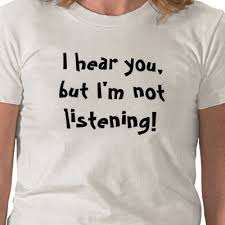We don’t know a lot of actual facts or scientific laws in psychology. We really only know two, but they both impact trial attorneys. The first one is:
Listeners exert control over the behavior of speakers.
What?
How could that be?
Isn’t it the other way around?
Try this experiment in your head—you ask (making you the speaker) one of your kids (making him the listener) “Would you, please, load the dishwasher.” Your son, without moving a muscle, stares at you blankly. What do you do next as a speaker?
What you would probably NOT do is say, “Thank you.”
____________________________________________________________________________________________________________
Try the same experiment this way: you ask your daughter to “Please load the dishwasher,” and she jumps up and immediately begins the task. You might very well say “Thank you” in this circumstance.
In both of these experiments, the behavior of the listeners (kids) controlled the subsequent behavior of the speaker (you, the parent).
____________________________________________________________________________________________________________
Research shows that you would probably alter your speaking behavior when your listener does not respond in the desired direction with one or more of these four techniques:
- Ask again
- Slow down your speaking
- Give a longer description (maybe including some idea of the consequences for a non-response)
- Change the tonal quality of your request
When a trial attorney, who is usually thought of as a speaker, knows that listeners control speakers, it can be used to an advantage in the courtroom.
For instance:
- During voir dire, you should do everything in your power to be a listener, not a speaker. You want to find out what prospective jurors are thinking. So, listen to the jurors while making eye contact, nodding, smiling, leaning toward the speaker—give the speaking jurors a “reward” for speaking (regardless of what they say). Skilled trial lawyers will listen so well that they will use words or phrases uttered by panel members during voir dire in their opening and closing to be able to more closely relate to the jurors in the jurors’ own language.
- While questioning witnesses:
- In a very recent trial, on direct examination, the expert witness used the term “best practices” in his answer. On the very next question, the attorney asked, “Have you ever heard of the term ‘best practices?’”–not good listening by the attorney. The attorney, by being a poor listener, created a condition where his own witness had to roll his eyes and forge on, knowing everyone caught the miscue.
- Same trial, same witness on cross-examination: The expert witness wanted to advocate in his answer to a simple yes/no question. What do you do as a listener when an expert goes beyond the question?
i. You can give the standard “Would you just please answer my question” statement, followed by some version of #1-#4 above. The risk is that giving this kind of attention to the answer shows that it bothered you and is, thus, important.
ii. You politely look at the judge for assistance, which may have the same effect, or
iii. You can employ the second behavioral law that psychologists really know, called “extinction.” You drop your eye contact, turn away a little, shuffle some papers, let it go on, then politely say something to the effect of “Are you finished?” Extinction (ignoring) decreases the likelihood that a behavior will be repeated. In the trial, the attorney had to do this twice in a row, was very polite, but firm, never interrupting the witness, never looking afraid of the answer, but the witness never tried it again. The elaborate answer just looked like it had no weight because it was not getting any listener attention. The listener controlled the behavior of the speaker.
- Finally, the jury: Juror non-verbal behavior (grimaces, smiles, fidgeting, note-taking, sitting expressionless, sleeping) is the only real feedback that they, as listeners, can give an attorney during trial. Here is my caution: be confident enough in your message that you do not let these listener behaviors throw you off track. How many times have you heard yourself say, “Juror #5 just won’t make eye contact. I think she’s against us,”? You try to think of ways to “win her back.” Juror #5, by her style of listening, has started to gain some control over your behavior by making you doubt your direction. Maybe she is against you. Maybe she is SO FOR YOU that she needs to hear no more and just wants to deliberate. Maybe that is just how she concentrates and has not made up her mind. Maybe that is how she tries to tell you that she has to get to the grocery store on the way home to buy some dog treats. Make eye contact with the jury on occasion, but don’t let them control how you deliver your case to them. This non-verbal juror feedback is classically unreadable and unreliable. Don’t let it throw you off.
- You will develop this confidence by listening to your focus groups and mock jurors telling you what they, the decision-making audience, think is important about your case.
Now, go get those dishes done, please.
Share This Story, Choose Your Platform!
Click below to add your email address to our mailing list and receive the latest Persuasion Tips right in your inbox!

